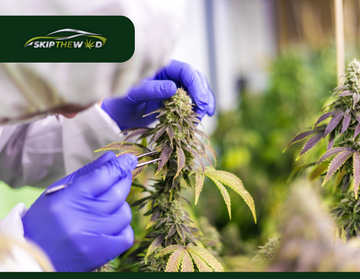Cannabis, commonly known as weed, is widely used for both recreational and medicinal purposes. But Have you ever thought about how it will affect your brain? The active compounds in cannabis, primarily THC (tetrahydrocannabinol) and CBD (cannabidiol), interact with the brain in different ways, leading to a variety of effects that range from altering your perception of time to potentially impacting your memory and mental health.
In this article, we’ll dive into how cannabis affects the brain, both in the short term and long term, the role of THC and CBD, and the potential therapeutic benefits it offers.
The Basics: How Cannabis Affects the Brain
The effects of cannabis on the brain are primarily due to its active ingredients, THC and CBD. Both compounds interact with the brain’s endocannabinoid system (ECS), a complex network of receptors that regulate various bodily functions such as mood, pain sensation, appetite, and memory. Here’s how each compound works:
- THC: This is the psychoactive component of cannabis that gives users the feeling of being "high." When THC enters the brain, it binds to cannabinoid receptors, specifically the CB1 receptors in the brain, releasing dopamine, a neurotransmitter associated with pleasure and reward. This leads to euphoria, altered perceptions, and relaxation.
- CBD: Unlike THC, CBD doesn’t produce a high. Instead, it has a calming effect on the brain. It works by interacting with other receptors in the ECS and can potentially help reduce anxiety, alleviate pain, and provide neuroprotective benefits.
Short-Term Effects of Weed on the Brain
When you consume cannabis, especially in high doses, you may experience immediate, short-term effects. These include:
-
1. Altered Perception of Time
One of the most well-known effects of THC is the distortion of time. THC can make you feel as if time is moving more slowly, which can lead to the sensation of hours passing by in what feels like minutes.
-
2. Euphoria and Relaxation
THC stimulates the release of dopamine, which gives you the feeling of pleasure, happiness, and relaxation. This is why cannabis is often used to enhance social experiences, enjoy music, or simply unwind.
-
3. Impaired Memory and Learning
THC can impair short-term memory, making it more difficult to retain new information while under the influence. This effect is typically temporary, but it can be disruptive in certain situations, such as studying or driving.
-
4. Increased Appetite
Known colloquially as the "munchies," THC increases hunger and food cravings. It affects the hypothalamus, the brain region that controls appetite, often causing you to crave snacks or comfort foods.
-
5. Impaired Coordination and Motor Skills
THC affects areas of the brain responsible for motor control, which can lead to slower reaction times and reduced coordination. This is why it's advised not to operate vehicles or heavy machinery after consuming cannabis.
-
6. Anxiety or Paranoia
While some people experience relaxation and euphoria, others may feel anxious or paranoid when using cannabis, especially with high doses of THC. If you are prone to anxiety, it’s important to be cautious with cannabis use.
Long-Term Effects of Cannabis on the Brain
Regular and heavy use of cannabis can lead to more profound, long-term changes in the brain. These effects can depend on several factors, including the frequency and amount of cannabis used, the age at which use began, and individual differences in brain chemistry.
-
1. Cognitive Impairment
Studies have shown that prolonged cannabis use, especially during adolescence when the brain is still developing, can result in long-lasting cognitive deficits. This can lead to difficulties with memory, learning, and concentration.
-
2. Changes in Brain Structure
Long-term cannabis use can alter the structure of certain areas of the brain, particularly those involved in memory and decision-making, such as the hippocampus and prefrontal cortex. These changes can impact cognitive function and emotional regulation.
-
3. Mental Health Risks
Heavy cannabis use has been associated with an increased risk of mental health disorders. Individuals who use cannabis frequently may be at a higher risk of developing anxiety, depression, or even psychosis, especially if there is a genetic predisposition.
-
4. Addiction
While cannabis is not as addictive as some other substances, regular use can lead to cannabis use disorder (CUD), where individuals find themselves needing cannabis to feel "normal" or experience withdrawal symptoms when they try to stop.
How CBD Affects the Brain
While THC is the primary psychoactive compound, CBD is gaining popularity for its potential therapeutic benefits. Unlike THC, CBD doesn’t cause a high, and it actually counters some of the negative side effects of THC, such as anxiety and paranoia. Here are some of the ways CBD affects the brain:
-
1. Reduced Anxiety and Stress
CBD has been shown to exhibit anti-anxiety (anxiolytic) effects. It interacts with serotonin receptors in the brain, which can help regulate mood and alleviate feelings of stress and anxiety.
-
2. Neuroprotective Effects
CBD has been studied for its potential to protect the brain from damage caused by neurodegenerative diseases such as Alzheimer’s and Parkinson’s. It may help reduce inflammation in the brain and promote the growth of new brain cells.
-
3. Mood Stabilization
CBD is being investigated as a treatment for mood disorders like depression. By regulating the serotonin system, CBD may help stabilize mood without the sedative effects of traditional antidepressants.
-
4. Seizure Control
CBD has shown promise in treating epilepsy. It is known to reduce the frequency of seizures in individuals with certain types of epilepsy, making it a potential treatment option for those who have not responded to traditional medications.
Conclusion: The Impact of Weed on Your Brain
Cannabis has a profound effect on the brain, with THC and CBD offering different experiences. THC produces euphoria, altered perceptions, and sometimes anxiety, while CBD promotes calmness and may have neuroprotective effects. In the short term, cannabis can impair memory, coordination, and time perception, but in the long term, heavy use may lead to cognitive impairment and changes in brain structure.
However, CBD holds therapeutic potential, especially for managing anxiety, depression, and certain neurological conditions. If you’re considering using cannabis for recreational or medical purposes, it’s important to understand its effects on your brain and make informed decisions based on your health and well-being.
At Skip The Weed, we offer a variety of high-quality cannabis products designed to enhance your experience. Whether you're looking for relief, relaxation, or a boost in creativity, our collection has something for everyone. Visit us today to explore our selection and find the perfect product for your needs.








